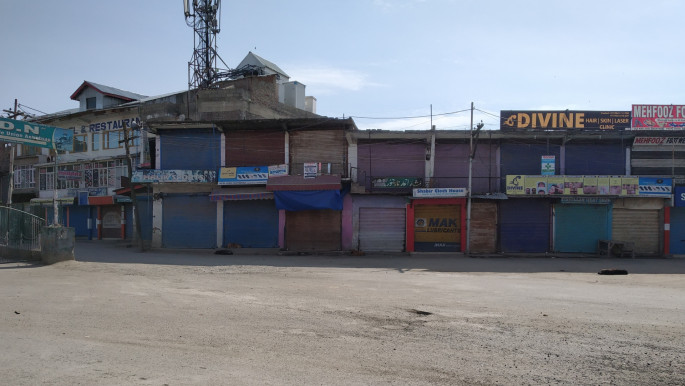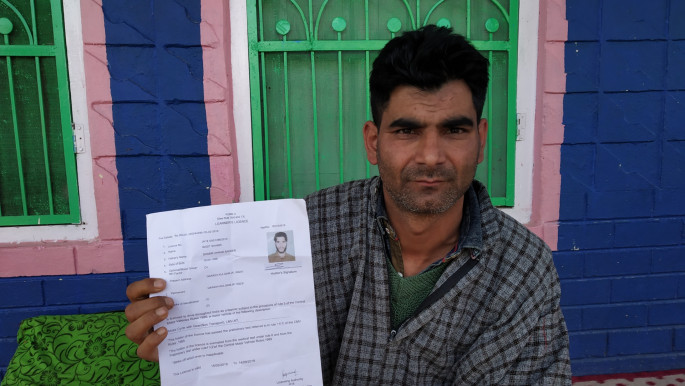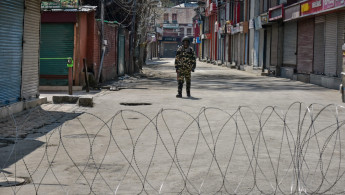Emerging from brutal Indian clampdown, Kashmir braces for coronavirus
Last month, Aslam, a resident of South Kashmir's Islamabad district in Indian-administered Kashmir, opened his shop for the first-time after a nearly six-month clampdown imposed by India.
The Muslim-majority region of Kashmir was stripped of its semi-autonomy by New Delhi in August 2019, with India detaining thousands of politicians and activists and moving tens of thousands of troops into the already heavily militarised territory.
"The ongoing lockdown will hit us hard," Aslam told The New Arab. "Our business is already shattered. After opening my shop in February, I had thrown out most of the products as they had passed their expiration dates."
"God forbid," Aslam continued, "if coronavirus spreads in Kashmir, we can't imagine how many people will die here, and mental health problems, which have already taken a heavy toll here due to the recent clampdown, will increase manifold."
 |
The Muslim-majority region of Kashmir was stripped of its semi-autonomy by India in August 2019, with thousands of politicians and activists arrested |  |
As the world battles Covid-19, people in Indian-administered Kashmir are bracing for disastrous consequences if the pandemic spreads, with residents in the disputed territory having just experienced a brutal six-month military clampdown.
The draconian Indian measures saw a strict security and communication lockdown, with the private sector, educational institutions, shops, restaurants and hotels shut for months.
Read more: Anger rages on over India's controversial Citizenship Amendment Act
In December last year, a report released by the Kashmir Chamber of Commerce and Industry (KCCI) estimated a loss of $2.4 billion due to the clampdown.
Business owners, like Amil Nazir, have witnessed a sharp decline in their profits.
"My business was already in collapse. I was about to go bankrupt because of exorbitant revenue loss. My interest in doing business in Kashmir was ended," Amil, who was struggling to grow his business, told The New Arab. "As I was settling my business again, the outbreak of coronavirus has brought all my plans to a standstill."
Business owners said they can't afford another lockdown as they are heavily indebted to banks and outside retailers.
 |
|
| All businesses in Kashmir have been closed. [Aamir Ali Bhat] |
"Had India not imposed a clampdown here last August we would have been ready to fight the Covid-19 like other countries," Aslam said. "We have been pushed to the brink. Neither can we go outside to earn a livelihood nor can we stay at home and watch our family members craving essential commodities."
But we have become more resilient as we have been witnessing clampdowns for more than thirty years now. We hope this too shall pass, and we will rise again."
In their bid to fight the spread of the coronavirus pandemic in Indian-administered Kashmir, authorities have ordered a lockdown, and there will be punishment for those who violate the rules. Except for essential facilities, all other services will remain closed until 14 April.
Besides banning the entry of travellers, the enforced lockdown has left roads deserted again as markets are shut, public transport banned and educational institutions closed.
 |
Had India not imposed a clampdown here last August, we would have been ready to fight Covid-19 like other countries -Aslam |
 |
The Department of Information and Public Relations (DIPR), on Wednesday said 11 cases have been confirmed in Indian-administered Kashmir so far, with over 5,000 people put under observation. In Ladakh, which was carved out from Indian-administered Kashmir in August last year and turned into a federally-administered territory, 13 cases have been reported.
Bashir Ahmad Rather, President of the Kashmir Traders and Manufacturers Federation (KTMF) said that they have no option than to stay at home to save themselves from the coronavirus pandemic.
"Everybody is voluntarily observing lockdown and we are with it because life should be the priority," Bashir told The New Arab. "But there is a concern for owners of small business outlets. They should be provided with compensation so that they can take care of their families."
An estimated 90 percent of shopkeepers in Kashmir have cash-credit loans, Bashir added.
Read more: Gory tales of torture in Indian-administered Kashmir
Despite calls for social distancing and quarantine, working-class residents, especially labourers, who are dependent on meagre-paying jobs and living hand-to-mouth, continue to go outside, interacting with others and working to support their families.
"What can I do?" a labourer asked. "My family will die of hunger if I can't go to work. I resumed my work after six months in February. People like me have only two options: Either die of hunger or due to coronavirus, let us leave that to Allah."
"We recently went through one disaster, how can we afford another. Who can feed my family if I can't go on work?"
 |
|
| Javaid Ahmad Badder’s nephew was detained last year during India’s crackdown and remains imprisoned . [Aamir Ali Bhat] |
'Release Kashmiri Prisoners'
As the novel coronavirus rapidly increases in India, social activists, lawyers and human rights defenders have called for the release of Kashmiri prisoners who were detained before and after India stripped Kashmir of its special status, and are incarcerated in faraway jails across India.
Zainab, 43, desperately wants to see her son Basit Ahmad Badder, who was detained during the night of 8 August last year by police and booked under Public Safety Act (PSA), a draconian law that allows police to detain anyone without trial for up to two years.
Basit was sent to Ambedkar Nagar jail in Utter Pradesh (UP), around 1,550 kilometres (963 miles) from his hometown.
Twitter Post
|
"On the one side doctors and officials have advised people to stay at home and maintain social distancing as these are the only measures that can save us from the deadly coronavirus, on the other hand, they have put my son in the dungeon, hundreds of miles away from me," Zainab told The New Arab, wringing her hands in despair.
"You can't imagine the pain I am going through. I want my son back at this moment. He should be before me."
In November last year, the Indian government claimed in parliament that 5,161 persons were detained since 5 August, out of whom 609 were under detention while the rest were released.
Scores of the detainees' reports suggest they have been booked under PSA and flown out of Kashmir because "prisons had run out of capacity."
Families of Kashmiri prisoners said conditions in Indian jails are unhygienic and mostly remain overcrowded with detainees, leaving their loved ones more vulnerable to the pandemic. They said they are demanding the immediate release of their relatives as the threat of coronavirus is increasing in India.
"When I went to meet my nephew more than a month ago, I found around 60 Kashmiri prisoners were detained in Ambedkar Nagar Jail," said Javaid Ahmad Badder, uncle of Basit. "We can't now even go to meet him because of the fear of coronavirus. May Allah keep him healthy and safe."
Follow him on Twitter: @Aamirbhatt3



